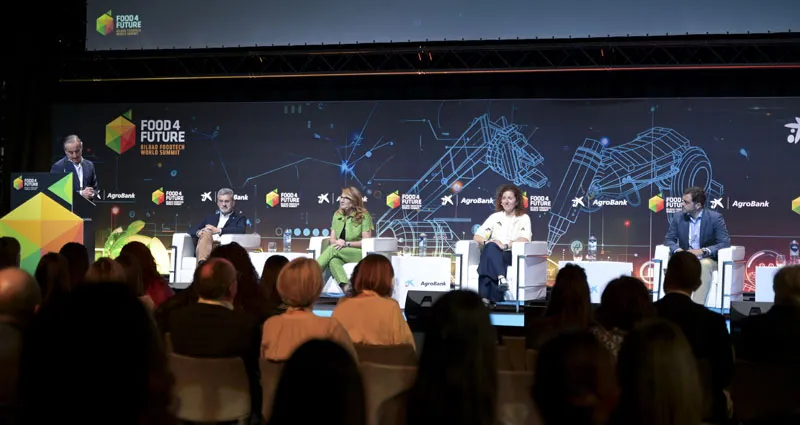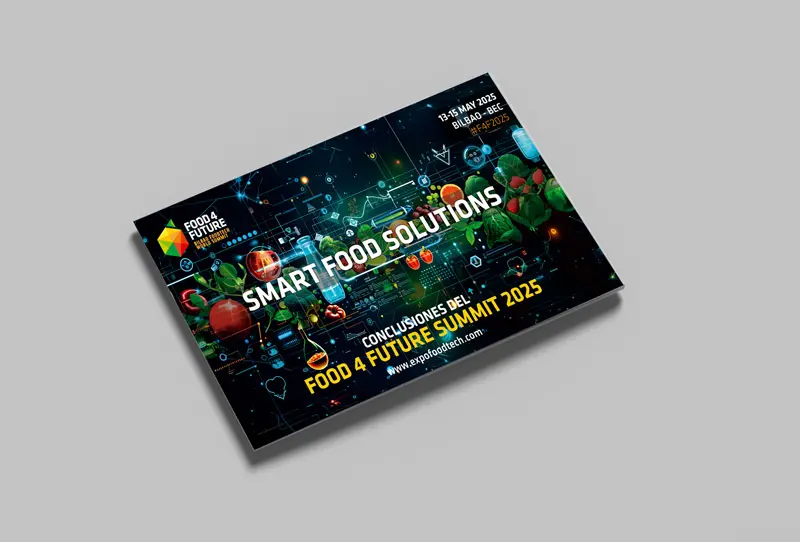

Content index
Bilbao, August 6, 2025. This year, Bilbao once again became the epicenter of food innovation with the joint celebration of Food 4 Future – Expo FoodTech and Pick&Pack for the Food Industry. This flagship event for the food tech sector brought together over 8,500 professionals, 379 national and international experts, and nearly 250 leading exhibitors across three days, establishing a new roadmap for an industry in urgent need of structural transformation based on technology, sustainability, and collaboration.
Drawing on the knowledge shared by key stakeholders across the value chain, Expo FoodTech, Pick&Pack, and the AZTI tech innovation team have identified 10 defining trends shaping the future of the sector in 2025:
AI is now a cross-cutting technology in the entire agri-food value chain. From crop forecasting to industrial automation and logistics optimization, its impact is clear: cost reduction, 40% lower energy consumption, and 35% reduction in CO₂ emissions. Companies like Eurecat and UMYNO Solutions are deploying AI-powered tools—digital twins, machine learning, and ERP-integrated platforms—that not only optimize operations but also drive more sustainable, resilient, and consumer-centric business models.
Smart robotics is revolutionizing everything from precision agriculture to in-plant logistics. In the field, real-time sensors and robotic arms monitor crop health to maximize yields. In factories, magnetic levitation technologies like XPlanar by Beckhoff Automation enable frictionless transport of goods, reducing wear and improving energy efficiency. Meanwhile, 3D printing allows for immediate, customized spare parts manufacturing, minimizing downtime and logistics costs. The challenge: automating without sacrificing adaptability.
Sustainability is evolving from a buzzword into a systemic transformation. It’s no longer just about lowering emissions, but about embedding economic, social, and environmental indicators into business models. Tools like Envirodigital, developed by AZTI, assess and reduce environmental impact across the product lifecycle, using the EU Product Environmental Footprint (PEF) framework. Industry examples abound: McCain aims for 100% regenerative agriculture by 2030; PepsiCo has launched a zero-emissions plant in Etxabarri; and cooperatives like Kaiku and COVAP promote sustainable practices in livestock farming. Sustainability is now a competitive edge.
Traceability has become a non-negotiable standard. Technologies like blockchain, smart labels, dynamic QR codes, and geolocation systems ensure food products can be traced from source to shelf—guaranteeing authenticity and reducing fraud risks. Carrefour, for instance, is already using blockchain for fresh produce, while platforms like OpenSC and Provenance are democratizing access to these tools. In an increasingly demanding market, transparency is a key competitive differentiator.

Fill out the form, and we’ll email you the download link.
jQuery("#descarga-azti-form > div > label > input[type=text],#descarga-azti-form > div > label > input[type=email]").on('change', function(){ if(jQuery(this).val() != '') { jQuery(this).parent().addClass("has-content"); } else { jQuery(this).parent().removeClass("has-content"); } });
const privacidad = document.getElementById("azti-acepto-privacidad"); const comunicaciones = document.getElementById("azti-acepto-comunicaciones"); const enviar = document.getElementById('azti-enviar'); if(privacidad.checked && comunicaciones.checked) enviar.removeAttribute("disabled", ""); privacidad.addEventListener("click", function (event) { if(privacidad.checked && comunicaciones.checked) enviar.removeAttribute("disabled", ""); else enviar.setAttribute("disabled", ""); }, false); comunicaciones.addEventListener("click", function (event) { if(privacidad.checked && comunicaciones.checked) enviar.removeAttribute("disabled", ""); else enviar.setAttribute("disabled", ""); }, false);
A major challenge for the food industry is the shortage of specialized talent. Amid an unprecedented digital and sustainable transformation, there’s a scarcity of professionals trained in robotics, AI, and data analytics. The message from Expo FoodTech 2025 is clear: hiring is not enough—companies must build engaging, value-driven cultures that attract and retain the next generation of talent. Offering purposeful work, real growth opportunities, and environments of trust will be just as vital as investing in technology.
The food sector is embracing open innovation and co-creation models to accelerate change. New platforms like Sandbox AgriFoodTech are enabling startups, R&D centers, and corporations to collaborate on disruptive solutions—with technical support, resources, and market guidance. Strategic partnerships that go beyond competition and foster shared learning, rapid experimentation, and agile implementation are key. Success will depend on building flexible networks with global vision and local execution.
Biotechnology is reshaping our diets. Precision fermentation, cell-based cultivation, and alternative ingredients like fungi, algae, and rubisco are driving a new wave of high-protein, low-impact foods. Institutions like AZTI are developing functional foods that match traditional products in taste and texture—while offering clear sustainability benefits. These innovations respond to growing demand and pave the way for more ethical, inclusive, and environmentally respectful nutrition.
Thanks to advances in genetics, microbiome science, AI, and sensor tech, personalized nutrition is now a reality. Solutions being developed by AZTI and others allow diets to be tailored to individual biology, lifestyle, and health conditions. This approach enhances wellbeing, helps prevent chronic diseases, and promotes active aging. According to EIT Food, by 2050, 30% of Europeans will be over 65, making nutrition a pillar of healthy longevity.
Packaging has evolved into a communication channel, logistics tool, and sustainability driver. At Pick&Pack 2025, innovations included smart labels, biodegradable materials, and edible packaging. These advancements extend product shelf life and enhance user experience. With 51% of European consumers prioritizing healthy and sustainable choices (EIT Food Consumer Observatory), packaging plays a decisive role in guiding purchase decisions.
Logistics—traditionally less digitized—is undergoing a revolution. Cold chain sensors, predictive analytics, and AI-powered dynamic routing are helping reduce losses, cut emissions, and boost food safety. Pick&Pack for Food Industry 2025 featured successful case studies in logistics digitalization, confirming that supply chain intelligence is now a strategic lever for competitiveness and crisis resilience, including responses to health or geopolitical disruptions.